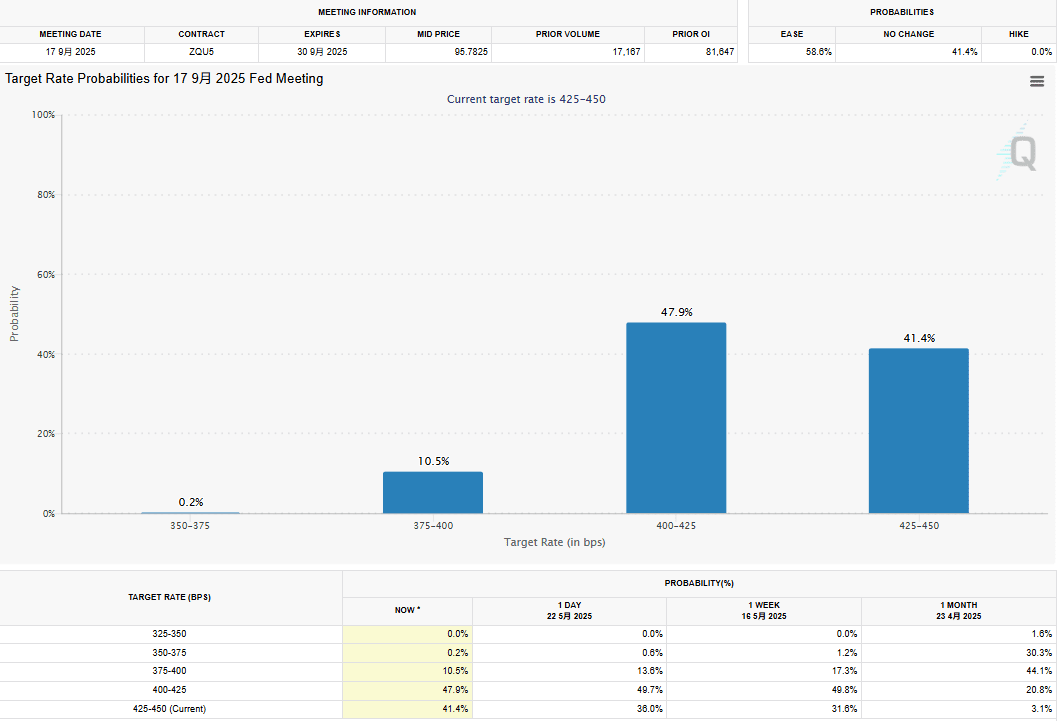
During this year's FOMC meeting, voting Federal Reserve Bank of Chicago President Austan Goolsbee stated that due to President Trump reigniting the tariff storm, the Federal Reserve may delay the timeline for interest rate adjustments. He said: 'While we wait for clear signals, regardless of the direction of action, my threshold is slightly higher.'
President Trump issued a significant tariff warning yesterday (23), threatening high tariffs against tech giant Apple and the European Union. Trump stated that if Apple's iPhone is not made in the U.S., a 25% tariff will be imposed; he also proposed a 50% tariff on imported goods from the European Union starting June 1. This move has caused market turbulence, with investors concerned that the uncertainty of the global supply chain and trade environment will intensify again.
Federal Reserve officials: Trump's tariffs may delay the timeline for interest rate adjustments.
Against this backdrop, during this year's FOMC meeting, voting Federal Reserve Bank of Chicago President Austan Goolsbee commented on Trump's tariff policy, pointing out that these threats complicate the Federal Reserve's monetary policy and may delay the timeline for interest rate adjustments.
In an interview on CNBC's (Squawk Box) program, this central bank official stated that although he still expects long-term interest rates to trend downward, the Federal Reserve tends to remain on hold temporarily when evaluating the impact of trade policy changes on inflation and employment. He emphasized:
Anything is possible. But I feel that while we wait for clear signals, regardless of the direction of action, my threshold is slightly higher.
Goolsbee further warned that Trump's tariff policy could pose the risk of 'stagflation,' where economic growth slows while inflation rises, which is the most challenging situation for central banks. He stated:
In the long run, if the tariffs they implement have stagflation effects, that would be the worst-case scenario for central banks. So I think we need to observe how significant the price impact is. I know people hate inflation.
Interest rates may significantly decline in the next 12 to 18 months.
Although expressing concerns about short-term trade policy, when discussing the Fed's future monetary policy, Goolsbee also stated: 'I don’t like to slightly tie our hands at the next meeting or even in the next six, eight, or ten meetings.' He recalled the economic environment before April 2, when the U.S. was in a relatively stable full employment state, and inflation was returning towards the 2% target. He said: 'If we can maintain these conditions, I think interest rates may significantly decline in the next 12 to 18 months.'
Additionally, according to the CME FedWatch tool, the market currently believes that in June and July, the Fed is more likely to maintain the current interest rate level unchanged, and if a rate cut is possible, it would be earliest in September, with a probability of 47.9%.

That's all for today.

During this year's FOMC meeting, voting Federal Reserve Bank of Chicago President Austan Goolsbee stated that due to President Trump reigniting the tariff storm, the Federal Reserve may delay the timeline for interest rate adjustments. He said: 'While we wait for clear signals, regardless of the direction of action, my threshold is slightly higher.'
President Trump issued a significant tariff warning yesterday (23), threatening high tariffs against tech giant Apple and the European Union. Trump stated that if Apple's iPhone is not made in the U.S., a 25% tariff will be imposed; he also proposed a 50% tariff on imported goods from the European Union starting June 1. This move has caused market turbulence, with investors concerned that the uncertainty of the global supply chain and trade environment will intensify again.
Federal Reserve officials: Trump's tariffs may delay the timeline for interest rate adjustments.
Against this backdrop, during this year's FOMC meeting, voting Federal Reserve Bank of Chicago President Austan Goolsbee commented on Trump's tariff policy, pointing out that these threats complicate the Federal Reserve's monetary policy and may delay the timeline for interest rate adjustments.
In an interview on CNBC's (Squawk Box) program, this central bank official stated that although he still expects long-term interest rates to trend downward, the Federal Reserve tends to remain on hold temporarily when evaluating the impact of trade policy changes on inflation and employment. He emphasized:
Anything is possible. But I feel that while we wait for clear signals, regardless of the direction of action, my threshold is slightly higher.
Goolsbee further warned that Trump's tariff policy could pose the risk of 'stagflation,' where economic growth slows while inflation rises, which is the most challenging situation for central banks. He stated:
In the long run, if the tariffs they implement have stagflation effects, that would be the worst-case scenario for central banks. So I think we need to observe how significant the price impact is. I know people hate inflation.
Interest rates may significantly decline in the next 12 to 18 months.
Although expressing concerns about short-term trade policy, when discussing the Fed's future monetary policy, Goolsbee also stated: 'I don’t like to slightly tie our hands at the next meeting or even in the next six, eight, or ten meetings.' He recalled the economic environment before April 2, when the U.S. was in a relatively stable full employment state, and inflation was returning towards the 2% target. He said: 'If we can maintain these conditions, I think interest rates may significantly decline in the next 12 to 18 months.'
Additionally, according to the CME FedWatch tool, the market currently believes that in June and July, the Fed is more likely to maintain the current interest rate level unchanged, and if a rate cut is possible, it would be earliest in September, with a probability of 47.9%.

